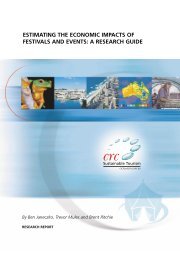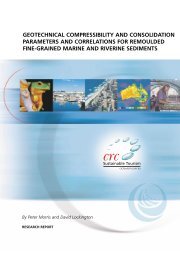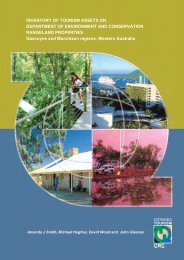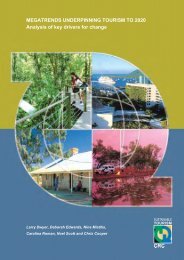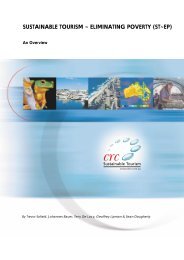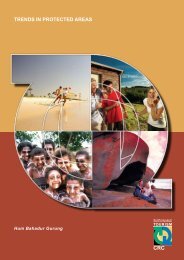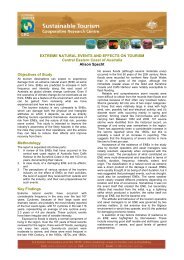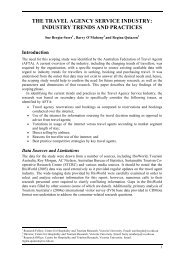icolls - Sustainable Tourism CRC
icolls - Sustainable Tourism CRC
icolls - Sustainable Tourism CRC
Create successful ePaper yourself
Turn your PDF publications into a flip-book with our unique Google optimized e-Paper software.
ECOLOGY, THREATS AND MANAGEMENT OPTIONS FOR SMALL ESTUARIES AND ICOLLS<br />
APPENDIX A: THE INTERMITTENTLY CLOSED AND OPEN<br />
LAKES (ICOLLS) SPECIAL SESSION AT THE ‘ESTUARIES AND<br />
CHANGE’ CONFERENCE<br />
Background<br />
In addition to the ecological work conducted as part of this project, we also sought to raise awareness and<br />
appreciation of ICOLLs among stakeholder and research scientist groups. To this end, Dr Wade Hadwen and<br />
Prof Angela Arthington coordinated an ICOLLs Special Session at the “Estuaries and Change” conference in<br />
Ballina, New South Wales. This was an international conference, co-sponsored by the Estuarine Coastal and<br />
Shelf Association (ECSA) and Estuarine Research Federation (ERF), which are the two largest scientific<br />
organisations that focus on estuarine research and management.<br />
The ICOLLs special session was first advertised on the conference website in the form of an abstract inviting<br />
participants to submit their abstracts for presentations into this session. The abstract for the special session read<br />
as follows:<br />
Special Session Abstract<br />
46<br />
Intermittently Closed and Open Lakes and Lagoons (ICOLLs)<br />
Session Convener: Dr Wade Hadwen w.hadwen@griffith.edu.au<br />
Griffith University, Australia<br />
Despite their abundance in many coastal regions, very little is known of the ecology, hydrology and<br />
geomorphology of ICOLLs. This special session aims to raise the profile of ICOLLs and estuaries and<br />
facilitate discussion and recognition of the role they play in maintaining key coastal processes.<br />
Particular emphasis is to be placed on eutrophication, commercial fishing, the forced opening and<br />
closing of ICOLL connections to the sea, and the effects that human activities may have on the ecology<br />
of these ecosystems.<br />
The response to this invitation to participate in the ICOLLs special session was extremely positive. A total of<br />
38 abstracts were submitted via this special session, making it the most popular of all sessions offered at the<br />
conference. Unfortunately, timetabling logistics allowed only 22 of the initial submitted abstracts to be accepted<br />
for the ICOLLs special session. Nevertheless, the ICOLLs special session ran over three days, as detailed in the<br />
table below. Significantly, there was a very wide range of issues covered across the presentations in the special<br />
session. The topics ranged from studies of water quality and artificial opening events to assessments of nutrient<br />
loads, fauna and flora and ecosystem responses to perturbations in these unique coastal environments.<br />
Furthermore, the geographical distribution and relevance of the ICOLLs session was evident given that<br />
contributions came from within Australia (New South Wales, Victoria, Western Australia), India and Sri Lanka,<br />
South Africa and Namibia and the southern part of North America (see table below). All abstracts submitted in<br />
the ICOLLs special session of the “Estuaries and Change” conference are presented in Appendix C.



